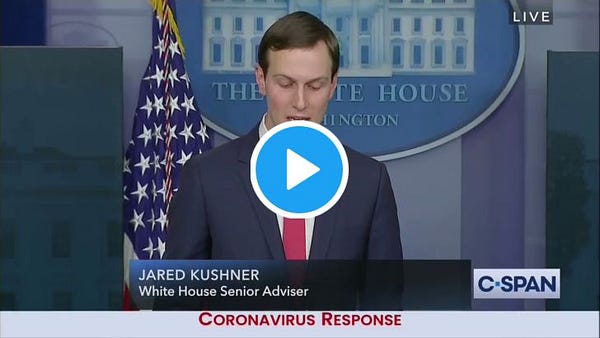How do you predict Jared Kushner?
A new risk to be analyzed
Today’s newsletter grapples with how to analyze a scenario posed by this Politico article.
Dozens of Trump administration officials have trooped to the White House podium over the last two months to brief the public on their effort to combat coronavirus, but one person who hasn't -- Jared Kushner -- has emerged as perhaps the most pivotal figure in the national fight against the fast-growing pandemic.
Jared Kushner is not qualified to be anywhere near this crisis.
He is not a public health expert. He is not an emergency management expert. He is the son of a real estate mogul whose personal track record in real estate was not great.
As you may recall, the Kushner family owns a troubled skyscraper in Manhattan located at 666 Fifth Avenue. Jared Kushner bought the building in 2007 for a record-setting $1.8 billion, a lofty price that marked the young developer's entry into high-profile New York dealmaking while also threatening to strain his family's personal finances should the transaction not work out.
It didn't work out.
How should the political risk industry approach a dilettante staffer who occasionally enters the picture but without the knowledge of what to do when there?


Kushner’s portfolio
Much has been made of Kushner’s wide-ranging remit in the White House.
He has, at various times, been involved in government reform, criminal justice, immigration, and the Middle East Peace Plan. Political commentators and analysts have noted that Kushner has failed to be effective in any of these roles.
Tufts professor Dan Drezner catalogued these results in this 180-tweet thread, the latest of which is here.





Forecasting COVID-19 responses
The political risk world is now almost entirely dedicated to COVID-19. How bad will it be and what happens after are the two questions most important to the industry.
Typically, risk analysts begin with a scenario in which governments act according to best practices and evidence. But what happens when a state ignores evidence and endangers its citizens?

Kushner as a political risk
It seems that we should treat Kushner not just as a presidential son-in-law, but as a political risk in his own right and as a stand-in for a wider political risk.
Francis Fukuyama tried to address the problem of “What is Governance” in 2013. In the abstract to his article, he writes:
there is very little agreement on what constitutes high‐quality government. The commentary suggests four approaches: (1) procedural measures, such as the Weberian criteria of bureaucratic modernity; (2) capacity measures, which include both resources and degree of professionalization; (3) output measures; and (4) measures of bureaucratic autonomy.
Jared Kushner lacks the experience needed for the jobs he is given, but is unlikely to be reassigned to a more fitting role. Kushner’s involvement in these high-profile issues therefore degrades Fukuyama’s first, second, and fourth aspects of governance.
There is also a non-zero chance that he enters the picture and duplicates the work of the existing bureaucracy and political appointees. We need to account for this.
As risk analysts, we need to include these once unimaginable factors, because these outliers are now the norm.
Towards a general theory of Kushnerism
As the reports from Governor Brian Kemp show, this issue is not restricted to Jared Kushner.
We have seen examples of good governance and bad from both Democratic and Republican officials. Andrew Cuomo, Jay Inslee, Charlie Baker, and Mike DeWine have acted in timely and appropriate manners. Bill de Blasio and Ron DeSantis, on the other hand, were both too slow to act.
However, it does seem clear that there is a tendency that active leadership reliant on experienced experts produces better governance. If an administration has an unqualified person in power, or if there’s a pattern of listening to people who are unqualified, then we must include that in our forecasts.
In the same way that a sportswriter thinks about a star pitcher’s injury history when predicting who which teams will make the playoffs, we should account for the chance that a state is “injured” by someone unqualified taking the lead.
As the political risk world takes stock of what COVID-19 has shown us after the pandemic passes, this is a lesson that we should learn.
Even the best prepared government is not ready for a disaster if it is not allowed to do its job.
----------
Thanks for reading.
Chris
About Two Lanterns
Two Lanterns Advisory is a political risk consultancy based in Boston, Massachusetts. For information on training courses in political risk, hiring a consultant, or commissioning reports, check us out at http://www.twolanterns.co.
